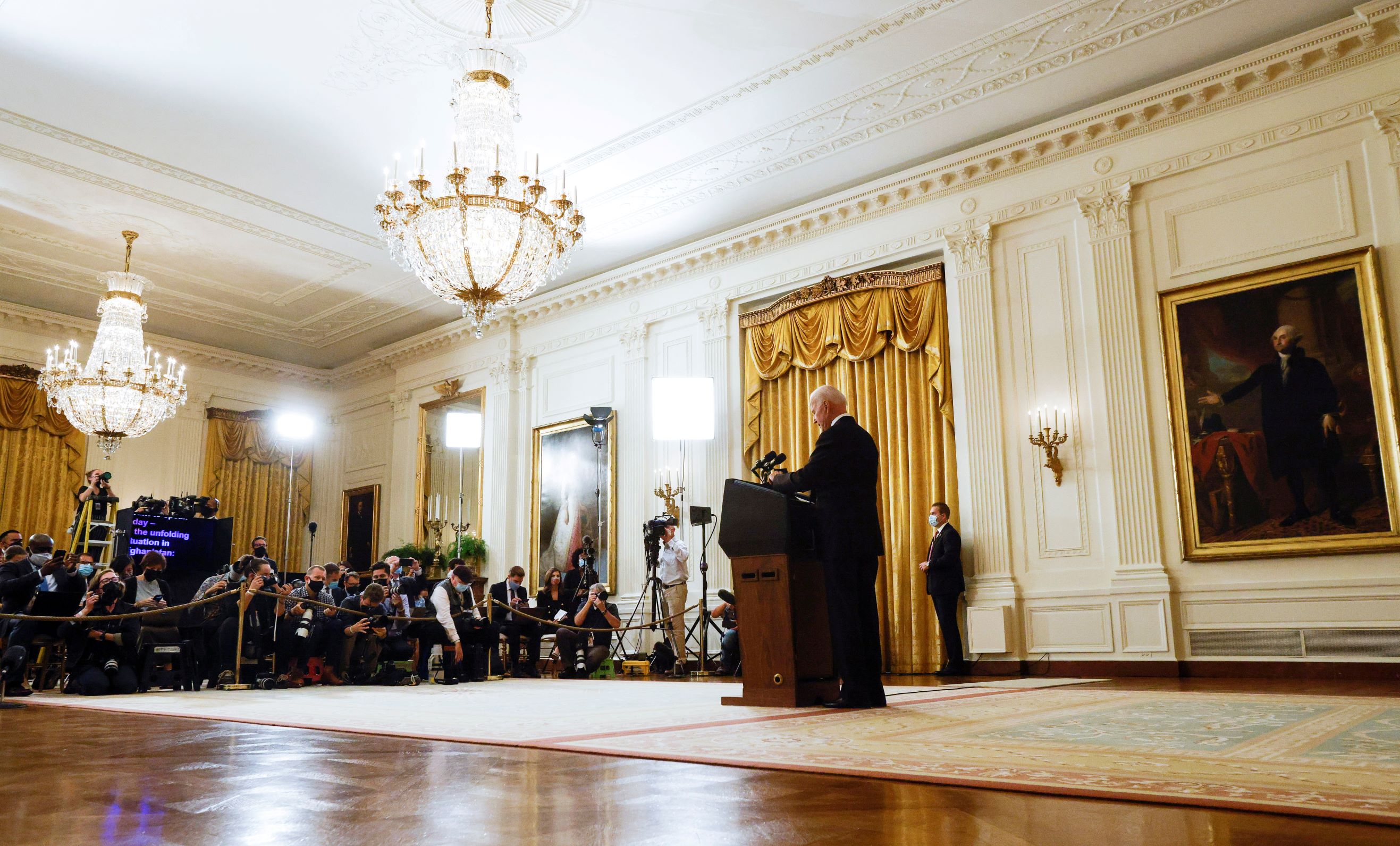The Consequences of the Taliban Victory in Afghanistan for U.S. Policy
On 15 August, after a lightning-fast military offensive, the Taliban entered Kabul, the capital of Afghanistan. The decision to withdraw U.S. forces from Afghanistan contributed to the Taliban’s rapid success. The Trump administration had negotiated an agreement with the insurgents, leading President Biden—contrary to the recommendations of military commanders to maintain some forces—decided to stick to the agreed timetable. However, the speed with which the Afghan government and security forces collapsed has undermined the prestige of the United States. The situation in Afghanistan will be used by politicians from the Republican Party in the campaigns ahead of the Congressional elections next fall.
 Photo: Leah Millis/Reuters
Photo: Leah Millis/Reuters
Why did the U.S. withdraw forces from Afghanistan now?
Attempts to withdraw American forces from Afghanistan and hand over responsibility for the state to the Afghan government were made during both the presidencies of Barack Obama and Donald Trump. Obama’s plan to leave the country by the end of 2016 failed due to political instability in Afghanistan and the increased activity of the Taliban. Trump, despite his personal declaration of intent to end the mission in Afghanistan, made U.S. military presence dependent on the situation in the country. In 2018, he launched direct negotiations with the Taliban to facilitate the development of a political agreement between the fighters and the government in Kabul. The militants and the U.S. reached agreement in early 2020, constituting the basis for the U.S. and international forces in the country as part of NATO operations to leave Afghanistan. In April this year, President Biden announced that U.S. forces would leave the country by 11 September, a decision supported by both Democratic and some Republican politicians.
What were the domestic policy goals that Biden wanted to achieve by withdrawing forces from Afghanistan?
The “endless wars” in Afghanistan and Iraq have been a factor in American politics for years, and the decision to maintain U.S. military involvement in both countries was a burden for representatives of both parties, including Biden. Ending these missions was one of his election promises. U.S. voters are largely opposed to maintaining military engagement in the countries, both because of the loss of troops—almost 2,500 U.S. soldiers died during the mission in Afghanistan—and the burden on the federal budget, with U.S. spending related to Afghanistan since 2001 at over $2 trillion. Warnings, however, about the consequences of the quick withdrawal of the last American troops did not change public opinion, and this translated into the Biden administration maintaining the decision to withdraw the troops completely. Moreover, the decision reflects changes in the U.S. strategic approach in which international terrorism no longer poses a primary threat to national security. In a speech on 16 August after the Taliban takeover, Biden defended his decision to withdraw forces from Afghanistan, arguing that the mission’s goals, focused on counterterrorism, had been achieved.
What are the main complaints about Biden’s decision?
The collapse of the government in Kabul and particularly the Afghan security forces has exposed the Biden administration to a wave of criticism. Most of the objections follow three lines of argumentation. The first considers it to have been a mistake to implement the decision on the complete withdrawal of the U.S. forces from Afghanistan on the timeline in the agreement with the Taliban, but contrary to the recommendations of the chairman of the Joint Chiefs of Staff and the commander of U.S. Central Command. According to the critics, the U.S. should have extended the presence of its troops in that country as long as it took to strengthen Ashraf Ghani’s government and weaken the Taliban politically. Other politicians and experts recognise the need to have withdrawn the troops completely in line with the deal, but point to its disastrous implementation, citing over-trust in the Taliban. The third group accuses the administration and U.S. intelligence has having too much confidence in the Afghan security forces and their ability to resist long enough to force the Taliban to negotiate with the government in Kabul.
Will the fall of Afghanistan be a significant factor in American politics?
The rapid takeover of power by the Taliban will be a source of increased criticism of the Democratic administration by Republicans. It will be fuelled by the likely reports of Taliban human rights crimes against Afghans, especially repression of those who collaborated with or simply worked with U.S. troops and the non-Taliban authorities. Republicans will try to undermine the Biden’s credibility on foreign policy, pointing to Afghanistan as an example of inefficiency, lack of allied solidarity, and a weakening of the United States in its confrontation with China and Russia. Republican politicians will use the defeat in Afghanistan as an opportunity to challenge their Democratic challengers in the campaigns before the “midterm” Congressional elections in the fall of 2022. Along with beneficial changes in constituencies (through redistricting) and seeking to distract from the ongoing COVID-19 pandemic, the Afghanistan issue may become a key element of the Republican election strategy.
How likely will the Taliban victory affect Biden’s other foreign policy plans?
The success of the Taliban reveals several mistakes by the current U.S. administration. By focusing on the withdrawal of troops, the political strengthening of the Taliban following the signing of the agreement was ignored. The military offensive that began after the start of the withdrawal of U.S. troops in May forced the U.S. to change its decision to maintain a diplomatic post in Kabul and resulted in the need to rapidly evacuate American personnel and as many Afghan colleagues as possible. The Taliban takeover of control is compared to the 1975 evacuation of Saigon—a stark failure in U.S. history. This undermines the image of a global leader that Biden is trying to rebuild. The situation in Afghanistan may affect the U.S. administration’s plans to reduce or completely end the military presence in Iraq. In the longer term, the U.S. approach to the region may change, resulting in a renewed increase in military involvement in connection with the high probability of an increased threat from international terrorist groups such as Al-Qaida, which may count on support among some Taliban factions.



